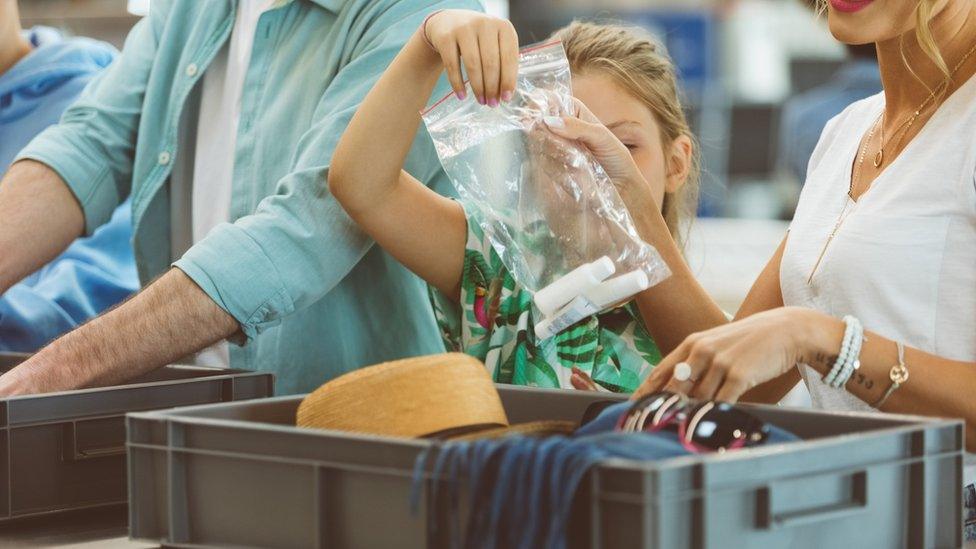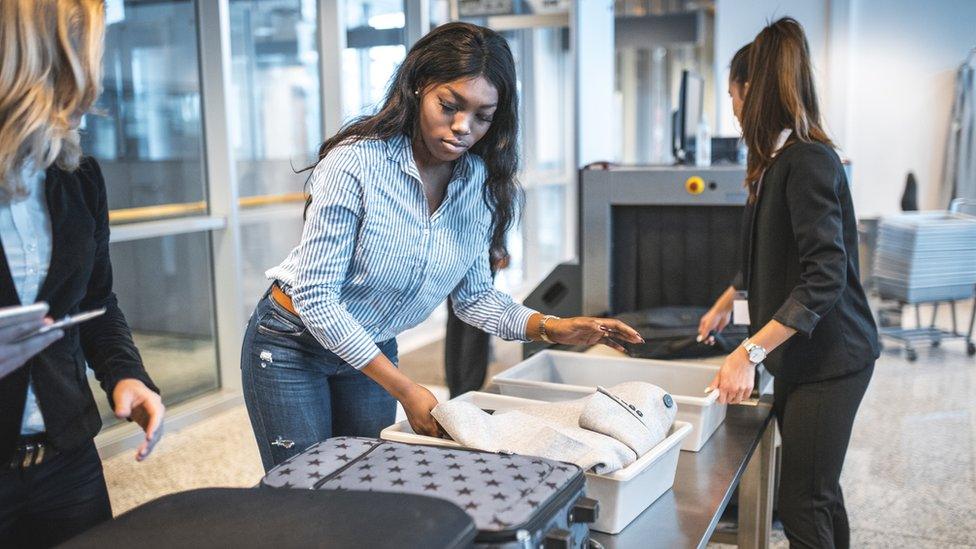Heathrow, Gatwick and Manchester airports not ready to lift liquids limit
- Published
- comments

Airline passengers at major airports will continue to face limits on the amount of liquid they can carry in hand luggage this summer after a deadline for new scanners was extended.
Major airports will be allowed by the government to miss the latest roll-out date for installing scanners to end the 100ml liquid limit.
London Gatwick, Heathrow and Manchester airports are not expected to have the technology in place in time for 1 June.
The delay could last for up to a year.
Airports had to apply individually for extensions, which could mean passengers may have to continue removing liquids and laptops from hand luggage until June 2025.
Smaller airports such as Teesside, London City, Birmingham and Newcastle have new security screening technology in place and expect to go live on time.
A Department for Transport source said the delays were for "genuine" reasons.
The Civil Aviation Authority will impose financial penalties on airports that keep missing deadlines, the DfT said.
The rules requiring liquids to be taken through security, in containers of 100ml or less in a clear plastic bag, were introduced in 2006 after a plot to bomb a transatlantic flight was foiled.
The new scanners use CT X-ray technology to provide 3D images so items can be left inside bags and liquids up to two litres will be permitted.
They are already used in some other countries including the US, although ministers claim the UK is the first in the world to attempt such a wide-scale rollout.
Airports were originally told to bring in new scanners by 2022, before the deadline was moved to 1 June this year.
Problems cited by airports include supply chain issues and the need for major construction to be carried out in order to have the scanners installed. The X-ray machines, similar to CT scanners used in hospitals, are very heavy and in some instances floors will need to be reinforced.
Karen Dee, chief executive of the Airport Operators Association trade body, said: "As with any programme of this complexity, there are significant challenges, and we are happy the government has recognised these and agreed to extend timeframes for delivery where necessary."
London Gatwick, Heathrow and Manchester are all expected to need more time to finish installing the new equipment across all their lanes. London City and Teesside International airports meanwhile, are the first to install the scanners across all their security lanes and switched to the new liquids rules in April 2023.
A source pointed out that Heathrow has 146 security lanes, more than any other UK airport, and the installation process had to be carefully managed to avoid hindering the flow of passengers.
Chris Woodroofe, managing director at Manchester Airport, recently told the BBC: "The vast majority of airports in the UK will still be in the process of switching out their scanners, just like we will be.
"So our message to passengers is please do come with your liquids in a liquid bag less than 100ml, and make sure you're ready to get your laptops out.
"And if you turn up and you happen to be in one of the new lanes, and we have some in this terminal, then that's great."
Passengers are also being advised to check the rules on liquids and devices at their destination or transfer airports before they fly in case the old rules are still in place there.
Teesside Airport's managing director, Phil Forster, told the BBC Today's programme that he sympathised with the problems larger airports have in trying to fit them.
"Clearly these are very expensive machines, very heavy machines, so some airports I know are looking at the weight of the flooring because some of the security services are on a different floor.
"We're in a very fortunate position because being a smaller regional airport we don't have as many security lanes and the vast amount of work [needed] to reconfigure."
- Published22 January 2024
